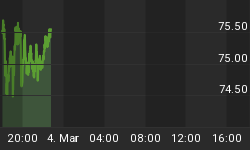The credibility of central banks is being questioned. In the United States, media reports point to growing dissension within the Federal Reserve about future policy decisions. Additionally, the European Central Bank (ECB), while initially having success in supporting bond prices, has recently seen its massive bailout effort wasted as a number of the member nations' bonds have resumed their declines.
Greek 10-Year Yield
Source: Bloomberg
Irish 10-Year Yield
Source: Bloomberg
Portugese 10-Year Yield
Source: Bloomberg
The above charts show that bond prices initially rose (yields fell) when the ECB announced that it would buy European government debt, but have since resumed their decline, and in some cases reached new crisis highs. The inability of the ECB to stabilize government bond prices despite its nearly one trillion dollar "shock and awe" announcement in May undermines its credibility. Furthermore, if the ECB again attempt to stabilize bond markets the Euro will resume its decline and could dramatically fall bringing even greater scrutiny of the European Central Bank.
Investors should question their long embedded confidence in the ability of central banks to support market prices. As Japan's experience has proven, and as the European situation may too, central banks are not bigger than markets, private capital flows or the economy.















